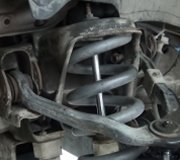You're describing a noisy front wheel bearing. That's very common on all car brands. It sounds like an airplane engine.
There's two effective ways to verify this. My favorite is to run the engine, in gear, on a hoist, then listen next to each bearing with a stethoscope. You'll hear a little noise from one, but then the noisy one will be obvious by comparison.
The other method is to raise the front tires off the ground, (be sure to use jack stands). Reach one hand over the top of the tire and wrap your fingertips lightly around one coil on the coil spring. Rotate the tire with your other hand. If that bearing is the noisy one, you'll feel the vibration in the spring.
Be aware for this style bearing, you can't be certain which one is noisy by listening which side the noise is coming from. The vibration and the noise can travel, appearing somewhere other than where it originated. The good news is with this bolt-on style of bearing, if you replace the wrong one, you can reinstall the old one on the other side.
If your car has anti-lock brakes, it's rather uncommon to have a noisy wheel bearing because they cause an ABS problem at a much lower mileage, often as little as 15,000 miles. The bearings develop a little play, which is normal, but GM's built-in wheel speed sensors generate too weak of a signal with that play. If you don't have ABS, you'll get a lot more life out of the wheel bearings, but at the mileage you listed, you're long overdue for those noisy bearings to develop.
Here's links to some related articles:
https://www.2carpros.com/articles/7-common-symptoms-of-a-bad-automotive-bearing-hub
https://www.2carpros.com/articles/bearing-hub-replacement
https://www.2carpros.com/articles/jack-up-and-lift-your-car-safely
https://www.2carpros.com/articles/whirring-sound
Please keep me updated on this.
Sunday, September 3rd, 2023 AT 8:17 PM


